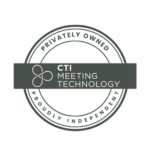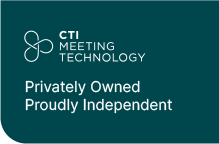Thinking of including a panel discussion in your next event? Great! This format is still very popular at conferences and events, and for good reason. Panel discussions gather experts to share their insights about a topic while actively engaging your audience. When done right, panel discussions provide the perfect mix of information and entertainment during in-person and hybrid events. At the end of the day, people are coming to your event to learn and educate themselves – but a bit of fun doesn’t hurt, right?
All of this is great news for event planners. A format that promotes active participation, education, and engagement? Sign me up! However, while panel discussions are a great way to liven up the event experience, it doesn’t mean they are easy to plan ahead of time.
Let’s face it, no one wants to attend a panel discussion that feels like a dull university lecture. While participants are coming to your event to learn and get educated, that doesn’t mean the presentation should be boring. As an organizer, the biggest challenges you may face are choosing the right topic, gathering a professional and engaging set of panelists, selecting a format that promotes attendee participation, and solving unforeseen technical issues. Choosing the right moderator is also vital; a balance is needed to ensure the discussion stays on track while allowing for spontaneous debates. Seems like a lot? No worries! Keep reading to learn how to plan the perfect panel discussion for your next event.
Choosing the Right Format
Panel discussions can be a great addition to your event, but only when planned well. Before even starting to plan the panel session, ask yourself what is the real objective of this discussion. Do you want to educate on a specific topic, provoke thought, or encourage your audience to take action about something? Once this goal is clearly established, you need to decide the format. You have a few options here. Let’s explore:
- Mainstage Style: This is the most traditional way to conduct a panel discussion. It basically consists of a group of panelists who are usually keynote speakers are the event. This is a short session where experts discuss a certain topic, but there is no space for audience questions.
- Open Discussion: You also have panelists discussing a certain topic during this session, sharing their insights and knowledge about the topic. The key point is that the audience has a voice and can ask panelists questions throughout the discussion or at a Q&A at the end of the session.
- Debate: This format works perfectly when there are two or more different viewpoints about a topic. Panelists are experts in the same field and they try to convince the audience of their point of view by presenting real-life examples and case studies.
The truth is, there is no right or wrong format. It all depends on your overall goals and the nature of the topic being discussed. However, one thing that you should always include is an opportunity for your audience to interact with the panelists. Try to choose a varied set of panelists for a more insightful experience.
Lastly, determine the total duration of the discussion. Panel discussions are usually placed at the end of a session, so keep that in mind to not go over the time! The duration will depend on the chosen format and the complexity of the topic, but as a rule of thumb, try not to go over 90 minutes. Find the sweet spot to discuss the topic in depth without boring your audience.
Preparing For Your Panel Discussion
A panel discussion consists of many moving parts. First, you choose a topic that is interesting and relevant to your event. Then you have to decide on the panelists. They have to be experts on the topic, but also charismatic enough to keep the audience’s attention. And of course, you need a moderator that ensures that the session runs smoothly. That’s why thoroughly planning in advance is key to hosting a successful panel discussion.
Start with the basics. You want to make sure the topic discussed is interesting to both your audience and the panelists. You can analyze which sessions were the most popular in similar events, or directly ask your audience which topics they would like to learn more about. The more ideas you hear, the better! After you choose the topic, organize a meeting with the panelists to talk about the format and objectives.
And because stage fright is very real, make sure you prepare enough material that your speakers can rely on. There is nothing worse than going blank during a discussion! Rehearse as many times as you can before the actual meeting; this will not only help ease your panelists’ anxiety but will also help you spot any areas that can be improved.
Last but not least, meet up with your moderator. This person plays a key role in the panel discussion, ensuring the talk flows smoothly, giving the audience the chance to participate, and keeping the discussion on the topic. A very important job as you can see, so choose your moderator wisely!
Audience Engagement
The main goal of your panel discussion should be to hold your audience’s interest throughout the session. This is why it’s important to dedicate enough time to researching topics and tools that will grab your participants’ attention. Ideally, you want an audience who engages with the conversation and asks questions. But why not take this a bit further?
Meeting technology can be a great ally. Using tools such as polling or Q&A apps can guarantee your audience will be glued to their seats and enjoy their time! Customized event apps are also very popular and promote a more inclusive experience. Remember, a silent audience is much scarier than a room full of chatty people!
- Engaging Introductions: Hook your audience right at the start of the session! Use an enthusiastic tone and open the discussion with a catchy phrase to grab the attention from the beginning. Continue with a brief introduction of the topic and the panelists. A good introduction is not only important to grab your audience’s attention but also to set expectations for the rest of the panel discussion.
- Questions: The easiest way to encourage attendees to ask questions is by slotting a Q&A section at the end of the discussion. However, you can also allow the audience to ask questions during the talk itself, shifting the discussion to the areas they are most interested in. Choose whatever works best for your format, but don’t forget this step!
- Polling: The best tool to gather audience feedback. Conduct a poll during your discussion for a more interactive experience and get relevant insights regarding the topic at hand. Furthermore, you can conduct a poll at the beginning of the discussion and again at the end to see how your audience’s opinion or knowledge shifted because of the panel.
- Using Social Media: You probably already use social media for your organization and event, so why not post about the panel discussion here as well? Create event-specific hashtags and encourage attendees to join the conversation to promote further discussion.
Technical Considerations
A microphone stops working, the live stream cuts, or the chat is not available for remote attendees. These are all very real possibilities that can happen during your panel discussion. Technical issues can hinder the whole experience and turn your panel discussion into a dull lecture in a matter of seconds. But no need to worry! Planning is your best friend – designate a tech team onsite with a well-laid-out setup that can help you fix these issues in no time.
Speaking of time, it flies when you’re engaged in an interesting conversation! Unfortunately, you don’t have unlimited time for your panel discussion. The moderator is usually the one in charge of checking the time periodically to ensure the discussion is not going over the allotted time. Also, make sure to dedicate enough time to every discussion point. No one likes rushing a conversation or ending it abruptly. Your panel discussion should run smoothly and tackle as many points as possible. To make it even easier, create specific time slots for every part of your session.
Post-Event Panel Feedback
Congratulations! You just wrapped up a successful panel discussion without any major issues. Still, you are not entirely sure of your panel’s popularity until you ask the audience. Their feedback is essential to understand what worked and which interactivity tools they preferred, but also the not-so-nice things. The more information the better! It will help you understand your audience better and hence, help you host better discussions in the future.
After the discussion, take time to send an email campaign to all attendees and panelists. Thank them for attending and contributing to the event, and don’t forget to include a post-event survey to gather their opinions about the discussion. Take a look at social media as well; sometimes attendees are more comfortable sharing their opinions in anonymity, but you can still improve from these comments and get new ideas for your next events.
To Wrap Up…
As you can see, a panel discussion can be what makes your good conference great. But planning it is not always a smooth ride. It requires thoughtful preparation beforehand, including a designated technical team to fix issues in real time. And your job doesn’t end after the panel discussion. Conducting a post-event analysis is crucial to measure the overall success of your discussion. But no worries! If you tackle these points, we can guarantee you will be prepared to host a successful panelist discussion that keeps your audience and panelists engaged.
And don’t forget to choose the right tech! Utilizing the right tools during your panel discussion can help the audience enjoy a more immersive and enjoyable experience. Next time you choose an event software provider, make sure you keep panel discussions in mind!
Not sure which meeting technology to leverage for your next event? Get in touch with us! We have vast experience assisting organizations in managing their events, which often include panel discussions. Our software has all the features you need to ensure a seamless and successful experience. Visit our website to know more.





